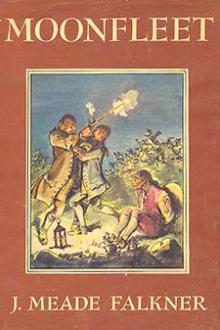Iron Throne, Ellen Gould-Harmon [rm book recommendations txt] 📗

- Author: Ellen Gould-Harmon
Book online «Iron Throne, Ellen Gould-Harmon [rm book recommendations txt] 📗». Author Ellen Gould-Harmon
"Annihilation was a cold and chilling thought, and accountability was sure destruction to all. The heavens were as brass over my head, and the earth as iron under my feet. Eternity--what was it? And death--why was it? The more I reasoned, the further I was from demonstration. The more I thought, the more scattered were my conclusions. I tried to stop thinking, but my thoughts would not be controlled. I was truly wretched, but did not understand the cause. I murmured and complained, but knew not of whom. I knew that there was a wrong, but knew not how or where to find the right. I mourned, but without hope."
In this state he continued for some months. "Suddenly," he says, "the character of a Saviour was vividly impressed upon my mind. It seemed that there might be a being so good and compassionate as to himself atone for our transgressions, and thereby save us from suffering the penalty of sin. I immediately felt how lovely such a being must be, and imagined that I could cast myself into the arms of, and trust in the mercy of, such a one. But the question arose, How can it be proved that such a being does exist? Aside from the Bible, I found that I could get no evidence of the existence of such a Saviour, or even of a future state. . . .
"I saw that the Bible did bring to view just such a Saviour as I needed; and I was perplexed to find how an uninspired book should develop principles so perfectly adapted to the wants of a fallen world. I was constrained to admit that the Scriptures must be a revelation from God. They became my delight; and in Jesus I found a friend. The Saviour became to me the chiefest among ten thousand; and the Scriptures, which before were dark and contradictory, now became the lamp to my feet and light to my path. My mind became settled and satisfied. I found the Lord God to be a Rock in the midst of the ocean of life. The Bible now became my chief study, and I can truly say, I searched it with great delight. I found the half was never told me. I wondered why I had not seen its beauty and glory before, and marvelled that I could have ever rejected it. I found everything revealed that my heart could desire, and a remedy for every disease of the soul. I lost all taste for other reading, and applied my heart to get wisdom from God."--S. Bliss, Memoirs of Wm. Miller, pages 65-67.
Miller publicly professed his faith in the religion which he had despised. But his infidel associates were not slow to bring forward all those arguments which he himself had often urged against the divine authority of the Scriptures. He was not then prepared to answer them; but he reasoned that if the Bible is a revelation from God, it must be consistent with itself; and that as it was given for man's instruction, it must be adapted to his understanding. He determined to study the Scriptures for himself, and ascertain if every apparent contradiction could not be harmonized.
Endeavouring to lay aside all preconceived opinions, and dispensing with commentaries, he compared scripture with scripture by the aid of the marginal references and the concordance. He pursued his study in a regular and methodical manner; beginning with Genesis, and reading verse by verse, he proceeded no faster than the meaning of the several passages so unfolded as to leave him free from all embarrassment. When he found anything obscure, it was his custom to compare it with every other text which seemed to have any reference to the matter under consideration. Every word was permitted to have its proper bearing upon the subject of the text, and if his view of it harmonized with every collateral passage, it ceased to be a difficulty. Thus whenever he met with a passage hard to be understood he found an explanation in some other portion of the Scriptures. As he studied with earnest prayer for divine enlightenment, that which had before appeared dark to his understanding was made clear. He experienced the truth of the psalmist's words: "The entrance of Thy words giveth light; it giveth understanding unto the simple." Psalm 119:130.
With intense interest he studied the books of Daniel and the Revelation, employing the same principles of interpretation as in the other scriptures, and found, to his great joy, that the prophetic symbols could be understood. He saw that the prophecies, so far as they had been fulfilled, had been fulfilled literally; that all the various figures, metaphors, parables, similitudes, etc., were either explained in their immediate connection, or the terms in which they were expressed were defined in other scriptures, and when thus explained, were to be literally understood. "I was thus satisfied," he says, "that the Bible is a system of revealed truths, so clearly and simply given that the wayfaring man, though a fool, need not err therein."--Bliss, page 70. Link after link of the chain of truth rewarded his efforts, as step by step he traced down the great lines of prophecy. Angels of heaven were guiding his mind and opening the Scriptures to his understanding.
Taking the manner in which the prophecies had been fulfilled in the past as a criterion by which to judge of the fulfillment of those which were still future, he became satisfied that the popular view of the spiritual reign of Christ--a temporal millennium before the end of the world--was not sustained by the word of God. This doctrine, pointing to a thousand years of righteousness and peace before the personal coming of the Lord, put far off the terrors of the day of God. But, pleasing though it may be, it is contrary to the teachings of Christ and His apostles, who declared that the wheat and the tares and to grow together until the harvest, the end of the world; that "evil men and seducers shall wax worse and worse;" that "in the last days perilous times shall come;" and that the kingdom of darkness shall continue until the advent of the Lord and shall be consumed with the spirit of His mouth and be destroyed with the brightness of His coming. Matthew 13:30, 38-41; 2 Timothy 3:13, 1; 2 Thessalonians 2:8.
The doctrine of the world's conversion and the spiritual reign of Christ was not held by the apostolic church. It was not generally accepted by Christians until about the beginning of the eighteenth century. Like every other error, its results were evil. It taught men to look far in the future for the coming of the Lord and prevented them from giving heed to the signs heralding His approach. It induced a feeling of confidence and security that was not well founded and led many to neglect the preparation necessary in order to meet their Lord.
Miller found the literal, personal coming of Christ to be plainly taught in the Scriptures. Says Paul: "The Lord Himself shall descend from heaven with a shout, with the voice of the Archangel, and with the trump of God." 1 Thessalonians 4:16. And the Saviour declares: "They shall see the Son of man coming in the clouds of heaven with power and great glory." "For as the lightning cometh out of the east, and shineth even unto the west; so shall also the coming of the Son of man be." Matthew 24:30, 27. He is to be accompanied by all the hosts of heaven. "The Son of man shall come in His glory, and all the holy angels with Him." Matthew 25:31. "And He shall send His angels with a great sound of a trumpet, and they shall gather together His elect." Matthew 24:31.
At His coming the righteous dead will be raised, and the righteous living will be changed. "We shall not all sleep," says Paul, "but we shall all be changed, in a moment, in the twinkling of an eye, at the last trump: for the trumpet shall sound, and the dead shall be raised incorruptible, and we shall be changed. For this corruptible must put on incorruption, and this mortal must put on immortality." 1 Corinthians 15:51-53. And in his letter to the Thessalonians, after describing the coming of the Lord, he says: "The dead in Christ shall rise first: then we which are alive and remain shall be caught up together with them in the clouds, to meet the Lord in the air: and so shall we ever be with the Lord." 1 Thessalonians 4:16, 17.
Not until the personal advent of Christ can His people receive the kingdom. The Saviour said: "When the Son of man shall come in His glory, and all the holy angels with Him, then shall He sit upon the throne of His glory: and before Him shall be gathered all nations: and He shall separate them one from another, as a shepherd divideth his sheep from the goats: and He shall set the sheep on His right hand, but the goats on the left. Then shall the King say unto them on His right hand, Come, ye blessed of My Father, inherit the kingdom prepared for you from the foundation of the world." Matthew 25:31-34. We have seen by the scriptures just given that when the Son of man comes, the dead are raised incorruptible and the living are changed. By this great change they are prepared to receive the kingdom; for Paul says: "Flesh and blood cannot inherit the kingdom of God; neither doth corruption inherit incorruption." 1 Corinthians 15:50. Man in his present state is mortal, corruptible; but the kingdom of God will be incorruptible, enduring forever. Therefore man in his present state cannot enter into the kingdom of God. But when Jesus comes, He confers immortality upon His people; and then He calls them to inherit the kingdom of which they have hitherto been only heirs.
These and other scriptures clearly proved to Miller's mind that the events which were generally expected to take place before the coming of Christ, such as the universal reign of peace and the setting up of the kingdom of God upon the earth, were to be subsequent to the second advent. Furthermore, all the signs of the times and the condition of the world corresponded to the prophetic description of the last days. He was forced to the conclusion, from the study of Scripture alone, that the period allotted for the continuance of the earth in its present state was about to close.
"Another kind of evidence that vitally affected my mind," he says, "was the chronology of the Scriptures. . . . I found that predicted events, which had been fulfilled in the past, often occurred within a given time. The one hundred and twenty years to the flood (Genesis 6:3); the seven days that were to precede it, with forty days of predicted rain (Genesis 7:4); the four hundred years of the sojourn of Abraham's seed (Genesis 15:13); the three days of the butler's and baker's dreams (Genesis 40:12-20); the seven years of Pharaoh's (Genesis 41:28-54); the forty years in the wilderness (Numbers 14:34); the three and a half years of famine (1 Kings 17:1) [see Luke 4:25;] . . . the seventy years' captivity (Jeremiah 25:11); Nebuchadnezzar's seven times (Daniel 4:13-16); and the seven weeks, threescore and two weeks, and the one week, making seventy weeks, determined upon the Jews (Daniel 9:24-27),--the events limited by these times were all once only a matter of prophecy, and were fulfilled in accordance with the predictions."--Bliss, pages 74, 75.
When, therefore, he found, in his study of the Bible, various chronological periods that, according to his understanding of them, extended to the second coming of Christ, he could not but regard them as the "times before appointed," which God had revealed unto His servants. "The secret things," says Moses, "belong unto the Lord our God: but those things which are revealed belong unto us and to our children forever;" and the Lord declares by the prophet Amos, that He "will do nothing, but He revealeth His secret unto His servants the prophets." Deuteronomy 29:29; Amos 3:7. The students of God's word may, then, confidently expect to find the most stupendous event to take place in human history clearly pointed out in the Scriptures of truth.
"As I was fully convinced," says Miller, "that all Scripture given by inspiration of God is profitable (2 Timothy 3:16); that it came not at any time by the will of man, but was written as holy men were moved by the Holy Ghost (2 Peter 1:21), and was written 'for our learning, that we through patience and comfort of the Scriptures might





Comments (0)